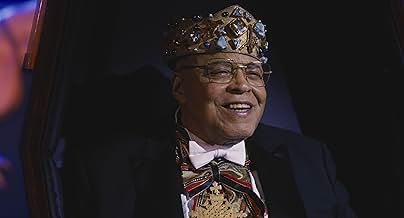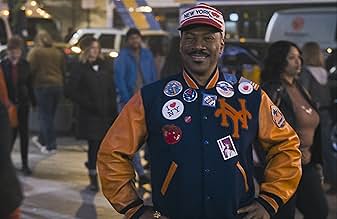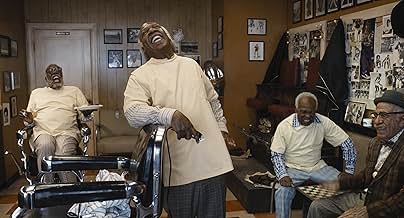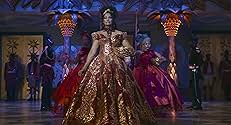Akeem fica a saber que tem um filho há muito perdido nos Estados Unidos e deve regressar à América para encontrar o improvável herdeiro ao trono de Zamunda. Uma sequela da comédia de 1988 "C... Ler tudoAkeem fica a saber que tem um filho há muito perdido nos Estados Unidos e deve regressar à América para encontrar o improvável herdeiro ao trono de Zamunda. Uma sequela da comédia de 1988 "Coming to America".Akeem fica a saber que tem um filho há muito perdido nos Estados Unidos e deve regressar à América para encontrar o improvável herdeiro ao trono de Zamunda. Uma sequela da comédia de 1988 "Coming to America".
- Direção
- Roteiristas
- Artistas
- Indicado a 1 Oscar
- 6 vitórias e 14 indicações no total
Avaliações em destaque
It's a 5.7... and it's trying to be a tribute to the first film-which was epic-but not a good tribute. Some jokes are good, some characters are ok (e.g Wesley Snipes) but the story and the writing are so lazy and uninteresting that instead of a comedy, it's a sleep-athon.
I give it above 5 because I liked the music, the performances, the costumes and the fact that the original cast got together for this. And for some nice jokes here and there. But...why didn't they try a bit more? With the likes of Eddie Murphy and Arsenio Hall you can get a great comedy. However, these guys didn't seem to enjoy much being there. The pace is slow and the energy is low in about 80% of the film. Tracy Morgan is not adding anything new and Leslie Jones... was more annoying than funny. The plus points here are that it's indeed a feel good movie if you don't fall asleep... 5.7/10 They could have tried a bit more.
When I rewatched the original Coming To America this week, I was struck by its timelessness - every scene still worked, every laugh line still felt quotable/funny. In 1988, it somehow managed to be both a classic fairytale and something that felt remarkably fresh (All Black cast?! Actors playing multiple characters?!). This movie meanwhile is...fine? I could not help but enjoy seeing the actors and their characters again, but that's not a movie. That's a reunion special. So we wound up with 2 different things happening: an updated version of the first film starring Jermaine Fowler and a bunch of cameos from the original. It is entertaining in fits and starts. But it is not timeless. It is not even cohesive. I have probably watched Coming To America 20 times, but I'm not sure I'll watch this one more than twice.
A far cry from the first one. The only thing good about Coming to America 2 is Wesley Snipes. And what is up with all the songs? If I want to watch singers singing their pop songs, I would just watch them on YouTube. Skip it.
I'm a longtime fan of Eddie Murphy, he belongs to that breed of likable comedians who can make a film that fails without failing by himself. "Coming 2 America" succeeds at least in one department: it makes you realize how good he used to be and how good he can be like in his recent (and better) "Dolemite". Now, to describe my feeling about "Coming 2 America" I will paraphrase Dewey from "Malcolm in the Middle": "I expect nothing but I'm still let down". In fact, that quote should be the stock answer to all these tiresome trends of rebooting, remaking and sequels or prequels that sprayed all over Hollywood creation like a certain virus in our everyday lives.
It's not that the film is bad but it's just a benign nostalgia-driven project that keeps basking in the shadow of the original whose references are expectedly countless. Some are cute like the three old guys' cameos and some downright funny like the promised bride who was still barking and jumping on one foot after thirty years; but unfortunately, the film can't live up to the same levels of fun and the material isn't original enough to be referenced to in ten years. The costumes and set-designs were visually creative but same can be said about "Cats".
What's the story about? Prince Akeem, now King of Zamunda, has three daughters, he's pressured by General Izzi, the tyrannic ruler of the neighboring country Nexdoria (got the joke?) into marrying his daughter Princess Meeka (KiKi Layne) with his son and thus guaranteeing an access to the throne because Zamunda can't be ruled by queens. At that precise moment, anyone can guess the obvious trajectory the plot will take. The problem isn't that the film takes a long detour through Queens to get to the obvious solution: change the law, but that the solution all depends on Akeem's good will. Indeed, the prince who challenged his own father, who rejected the tradition, wouldn't change the rule. Of course, if he did, there would be no story and maybe the first film didn't need a sequel to begin with.
To his defense, Murphy throws in the script a few lamentations about Princes generally changing once they become kings but that aspect left me with an uncomfortable thought: in the end of the first "Coming to America", Akeem resigned himself and if it wasn't for Lisa having an afterthought or his father Jaffe Joffer changing the rule, he wouldn't have married the girl of his dreams. Now, why wouldn't he make the same move to let his rather competent daughter fulfill her dream? I started looking Akeem as a hypocrite and I blame the sequel for that. And when he is put in his place by Lisa (Shari Headley) and everybody's supposed to be "about time!", I was like "couldn't that conversation happen before and spare all the trouble?".
But I'm reading too much. You can tell there's a reason why this problem exists: the same than the 'forced marriage' thing, it's the unfair law that must be canceled. That's the point. And so it's a foregone conclusion that Meeka will become the queen. If you don't get that instantly, you've missed many movies of the 2010s (not that you missed much). My suspicions raised with the martial arts fighting sequence with Akeem practicing with his daughters, it was as if Eddie Murphy just discovered the "girl power" thing almost one decade too late, making the film dated in its attempt to be in touch with today's trendy streams of inspiration. The problem is that his daughters aren't given much screen-time anyway so the script begs us to root for them while dedicating the whole storyline to the illegitimate son: Lavelle played by Jermaine Fowler.
Lavelle is referred with the b-word (the film's most memorable running-gag), the unwanted result of an intoxicated night with one distinguished lady they met in the nightclub. That's the best they could come up in a flashback sequence that provides a few clips reminding us how awesome the original was. Akeem has no trouble finding Lavelle, he's a likable loser who welcomes with enthusiasm the prospect of being a prince, and so does his mother played by Leslie Jones. And so what we got is a reverse formula of the original where you never exactly know whether Africa is honored or mocked, Zamunda was supposed to be an expositional joke to highlight the contrast with America but Murphy handles the matters of succession with utter seriousness while providing the worst caricatures about the continent.
That African fantasy is a source of one-note jokes awkwardly contrasting with the whole theme of inequality. Even the romance between Lavelle and a groomer named Mirembe (Nonzamo Mbatha) has to get in that territory. Had the film delivered its share of laughs, that would have made for a more enjoyable experience. It started well but went downhill after the death of Jaffe (James Earl Jones). Arsenio Hall is underused as Semi, Tony Amos add some gravitas to Akeem's position recalling his more progressive mother, and well we have the "references" to ornate the rather half-baked comedy and so many musical cameos I felt like watching MTV. The film put me in such a sorry state of mind that when I saw the three guys in the barbershop, I thought they should be logically dead. My spirit was.
This is not a bad film because it is predictable, the original wasn't a masterpiece of originality either, but it just didn't have that energy, that gentle silliness the original had (Craig Brewer is no John Landis), it was like Akeem: too pompous and civilized for his own good and so obsessed with rules and the etiquettes he wasn't aware of his own contradictions. I said about the original that it was pure 80s fun, in a way the sequel also exemplifies the 2020s: a lackluster era where remaking what's old stands for newness. Like I said, I expected nothing but...
It's not that the film is bad but it's just a benign nostalgia-driven project that keeps basking in the shadow of the original whose references are expectedly countless. Some are cute like the three old guys' cameos and some downright funny like the promised bride who was still barking and jumping on one foot after thirty years; but unfortunately, the film can't live up to the same levels of fun and the material isn't original enough to be referenced to in ten years. The costumes and set-designs were visually creative but same can be said about "Cats".
What's the story about? Prince Akeem, now King of Zamunda, has three daughters, he's pressured by General Izzi, the tyrannic ruler of the neighboring country Nexdoria (got the joke?) into marrying his daughter Princess Meeka (KiKi Layne) with his son and thus guaranteeing an access to the throne because Zamunda can't be ruled by queens. At that precise moment, anyone can guess the obvious trajectory the plot will take. The problem isn't that the film takes a long detour through Queens to get to the obvious solution: change the law, but that the solution all depends on Akeem's good will. Indeed, the prince who challenged his own father, who rejected the tradition, wouldn't change the rule. Of course, if he did, there would be no story and maybe the first film didn't need a sequel to begin with.
To his defense, Murphy throws in the script a few lamentations about Princes generally changing once they become kings but that aspect left me with an uncomfortable thought: in the end of the first "Coming to America", Akeem resigned himself and if it wasn't for Lisa having an afterthought or his father Jaffe Joffer changing the rule, he wouldn't have married the girl of his dreams. Now, why wouldn't he make the same move to let his rather competent daughter fulfill her dream? I started looking Akeem as a hypocrite and I blame the sequel for that. And when he is put in his place by Lisa (Shari Headley) and everybody's supposed to be "about time!", I was like "couldn't that conversation happen before and spare all the trouble?".
But I'm reading too much. You can tell there's a reason why this problem exists: the same than the 'forced marriage' thing, it's the unfair law that must be canceled. That's the point. And so it's a foregone conclusion that Meeka will become the queen. If you don't get that instantly, you've missed many movies of the 2010s (not that you missed much). My suspicions raised with the martial arts fighting sequence with Akeem practicing with his daughters, it was as if Eddie Murphy just discovered the "girl power" thing almost one decade too late, making the film dated in its attempt to be in touch with today's trendy streams of inspiration. The problem is that his daughters aren't given much screen-time anyway so the script begs us to root for them while dedicating the whole storyline to the illegitimate son: Lavelle played by Jermaine Fowler.
Lavelle is referred with the b-word (the film's most memorable running-gag), the unwanted result of an intoxicated night with one distinguished lady they met in the nightclub. That's the best they could come up in a flashback sequence that provides a few clips reminding us how awesome the original was. Akeem has no trouble finding Lavelle, he's a likable loser who welcomes with enthusiasm the prospect of being a prince, and so does his mother played by Leslie Jones. And so what we got is a reverse formula of the original where you never exactly know whether Africa is honored or mocked, Zamunda was supposed to be an expositional joke to highlight the contrast with America but Murphy handles the matters of succession with utter seriousness while providing the worst caricatures about the continent.
That African fantasy is a source of one-note jokes awkwardly contrasting with the whole theme of inequality. Even the romance between Lavelle and a groomer named Mirembe (Nonzamo Mbatha) has to get in that territory. Had the film delivered its share of laughs, that would have made for a more enjoyable experience. It started well but went downhill after the death of Jaffe (James Earl Jones). Arsenio Hall is underused as Semi, Tony Amos add some gravitas to Akeem's position recalling his more progressive mother, and well we have the "references" to ornate the rather half-baked comedy and so many musical cameos I felt like watching MTV. The film put me in such a sorry state of mind that when I saw the three guys in the barbershop, I thought they should be logically dead. My spirit was.
This is not a bad film because it is predictable, the original wasn't a masterpiece of originality either, but it just didn't have that energy, that gentle silliness the original had (Craig Brewer is no John Landis), it was like Akeem: too pompous and civilized for his own good and so obsessed with rules and the etiquettes he wasn't aware of his own contradictions. I said about the original that it was pure 80s fun, in a way the sequel also exemplifies the 2020s: a lackluster era where remaking what's old stands for newness. Like I said, I expected nothing but...
So glad I ignored all the bad reviews. Good fun movie, seeing all the characters again brought back some great memories. Don't be put off by all the negativity, give it a try for yourself.
Eddie Murphy Through the Years
Eddie Murphy Through the Years
From Reggie Hammond in 48 Hrs. to Chris Carver in Candy Cane Lane, take a look back at the iconic career of Eddie Murphy.
Você sabia?
- CuriosidadesJames Earl Jones was 88 years old when he filmed his scenes. Although in reasonably good health for a man of his age, and happy to appear in this movie, James did not want to travel far to do so. His scenes were shot in one day on a rented TV soundstage nearer his home on the New York state/Connecticut border, without any of the other cast members present. It was to be Jones' final feature film role.
- Erros de gravaçãoThe Lion's whiskers are white. When Prince LaVelle cuts the whiskers, they are white and only a few are cut. The next scene, the whiskers are two-toned and are more than what was cut.
- Cenas durante ou pós-créditosBefore the closing credits are almost gone, Saul is interrupting them to tell a joke, like in the first movie. In this film, Saul is reciting "The Signifying Monkey" as made popular by Dolemite aka Rudy Ray Moore, the real-life person Eddie Murphy played in his previous film, Meu Nome é Dolemite (2019), also directed by Craig Brewer.
- Trilhas sonorasMbube
Written by Solomon Linda
Principais escolhas
Faça login para avaliar e ver a lista de recomendações personalizadas
Detalhes
- Data de lançamento
- País de origem
- Idioma
- Também conhecido como
- Un príncipe en Nueva York 2
- Locações de filme
- Empresas de produção
- Consulte mais créditos da empresa na IMDbPro
Bilheteria
- Orçamento
- US$ 60.000.000 (estimativa)
- Tempo de duração1 hora 50 minutos
- Cor
- Mixagem de som
- Proporção
- 2.00 : 1
Contribua para esta página
Sugerir uma alteração ou adicionar conteúdo ausente










































